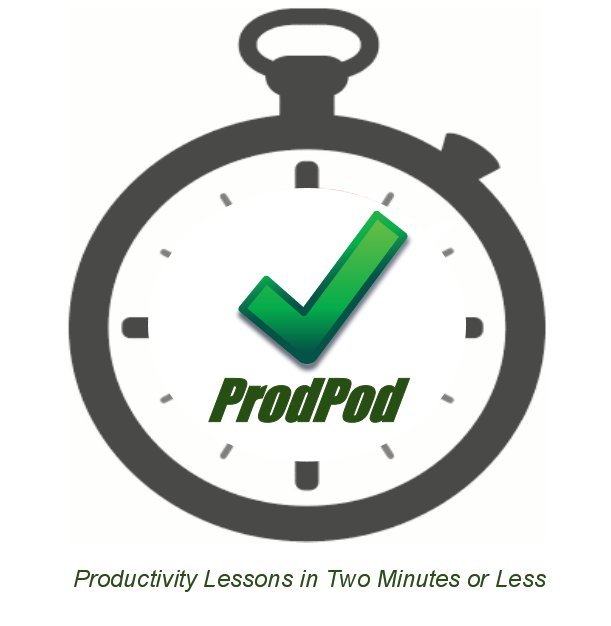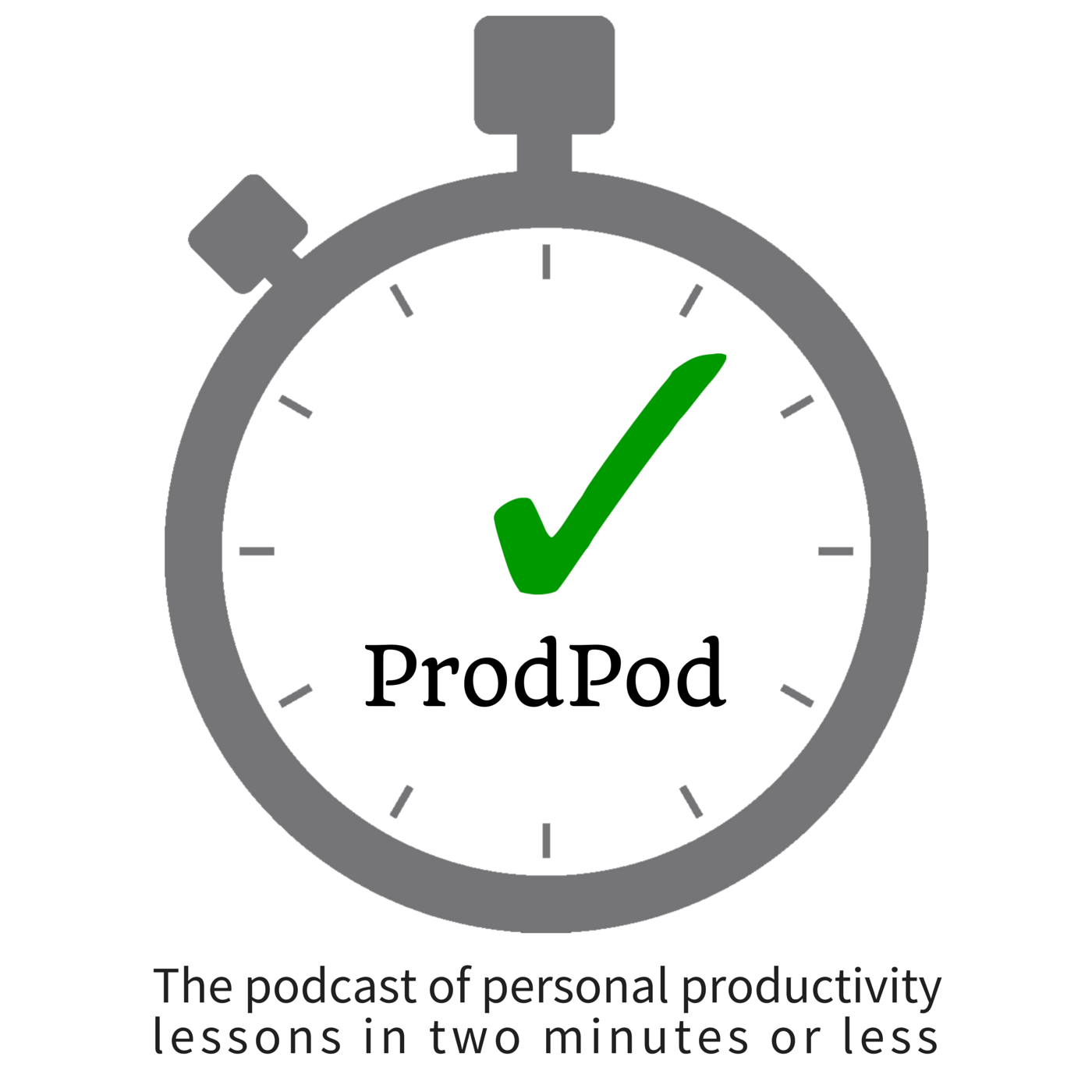Episodes

Tuesday Jul 17, 2012
Tuesday Jul 17, 2012
This is the final episode in our four-part ProdPod series on outsourcing your personal tasks in life...this episode is on getting started with bartering your personal tasks.
To get started...
Grab a paper ledger journal from the local office supply store (or if you're tech savvy, create an Excel or Google Spreadsheet workbook). Each sheet is dedicated to one person. Discuss with your barter buddy (or buddies) the terms of your arrangement. Each task is worth one credit and you should both track the credits of yourself and the other, so you can make sure that you're responsibly handling any conflicts that may arise. Determine how the credits can be used and make note of them in your journal or spreadsheets. Some credits will have expiration dates, some bartering relationships will reset every month, quarter or year. And, in the initial phase, I'd make sure to start with a test period where you can renegotiate the bartering relationship with your barter buddy after the first few times for any reason if the arrangement is just not working for either of you, without hard feelings or false assumptions. Relationships are far more important than a few poorly-laundered t-shirts!
The best items to barter are routine items that each party does on a weekly or monthly basis so there's less management involved. But, I've found that with co-workers you can get around many management problems and organizational productivity shortcomings by creating a bartering market. There's no doubt this requires much more planning but it can pay off if executed properly and managed responsibly. I believe that bartering tasks and projects for greater productivity is an untapped resource we all have access to in our ever-increasingly hectic lives, and all you need to do is ask the people you know.

Tuesday Jul 10, 2012
Tuesday Jul 10, 2012
We discussed in the last episode about the idea of using virtual assistants, personal concierges and daily money managers to help get more done in life without you doing all of it. In this episode in our four-part ProdPod series on personal outsourcing, I will be explaining for you how to use an age-old concept of outsourcing tasks for greater productivity...for free, bartering.
You know what bartering [http://www.gettingmoneywise.com/2011/12/swap-share-and-land-bartering.html?m=1] is. You have an apple and I want to buy an apple. And, I have an orange and you want an orange. But, neither of us has any currency. So, we decide that instead of buying the fruits from each other or from a market, we'll just exchange your apple for my orange. It turns out that we can translate bartering vis-a-vis your productivity.
Think about everyone in your life: co-workers, spouses, children, other family members, friends, acquaintances, and more. Did you ever find that you like to do certain things in life and others in your life enjoy doing the things you find difficult, boring and time-consuming? Why not swap tasks for greater efficiencies? For example, do you hate grocery shopping but love doing laundry? Ask your friend who lives nearby if s/he would be willing to swap duties. Or, perhaps you have to send out holiday cards every year and you always struggle to get them out on time, and your mother is great at the task but needs some help every year wrapping all the grandchildren's presents and that happens to be something you enjoy doing. Why not barter the card-writing for the gift-wrapping? I'm giving very simple examples, but get creative. You'd be surprised what your support network doesn't want to do and would be willing to do for you not to have to do their own stuff. You will find the efficiencies remarkable when you realize how little work it is to do a bit extra work doing what you enjoy and not do the things you really don't want to or never get around to doing.
In the final episode in this series, I'll give you a quick-start guide on how to begin personal tasks bartering.

Tuesday Jul 03, 2012
ProdPod: Episode 39 -- Outsource Your Personal Tasks, Part II
Tuesday Jul 03, 2012
Tuesday Jul 03, 2012
In this second episode of a four-part ProdPod series on outsourcing personal tasks, I introduced the idea of hiring a virtual assistant, personal concierge and daily money manager. In this episode, I'll explain what each is and why you would need one.
In the last episode, I introduced the idea of hiring a virtual assistant, personal concierge and daily money manager. In this episode, I'll explain what each is and why you need one.
Virtual assistants are never physically present and the equivalent to having an executive assistant. Many small business owners use them for varying levels of administrative, marketing and management duties. While they are utilized by businesses and executives most often, there's no reason why you can't hire them to do the same tasks that you would otherwise need to do yourself when you have better things to do with your time. Do you need research done for a report you need to write? Have your virtual assistant research and organize it for you. Do you need to organize your music library on your computer at home? Use a secure service such as LogMeIn Free and have him/her log in to your computer to do it for you. In the Internet Age, there's very little that cannot be done with merely a cellphone, email and a Web browser.
On the other hand, personal concierges are usually hyper-local services and are good for checking in the on the fish while you're away on vacation, waiting for the cable guy to supervise the installation of your new service and equipment, or picking up the dry cleaning or groceries. For those of us with long work hours and without spouses (or both spouses work full-time), these routine errands can really be a bear and a personal concierge service can be mighty beneficial.
Do you find it tough to find the time to pay your bills regularly or have the discipline to save? Does your mother or father's aging limit their ability to do their financial management as well as they used to? Or, are they forgetting to pay utilities? Well, you may not need a financial planner or accountant for these simple, personal bookkeeping duties. This is where a daily money manager might just be what you need.
The opportunities abound when it comes to outsourcing in your personal life, and I know that not everyone has the money to pay for a virtual assistant in their life. So, in episode 40, I'll be talking about a different way to outsource your personal tasks that doesn't require hiring anyone. Stay tuned.
I hope you enjoyed this episode of ProdPod. I'm Ray Sidney-Smith and thanks for listening. Here's to your productivity success...in two minutes or less!

Tuesday Jun 26, 2012
ProdPod: Episode 38 -- Outsource Your Personal Tasks, Part I
Tuesday Jun 26, 2012
Tuesday Jun 26, 2012
Welcome to Episode 38 of ProdPod, the podcast of productivity lessons in two minutes or less. This is the first episode in a four-part ProdPod series on outsourcing your personal tasks in life. Enjoy!
For many of us, we feel overwhelmed not by the many things we are doing on a daily basis but by the many things we want to be doing additionally or instead of what we're already doing everyday. Furthermore, we find ourselves responding more often to communication than actively doing what we've planned. Think of Dr. Stephen Covey's thoughts on doing more "important, not urgent" activities than the other three quadrants of "not important, not urgent," "not important, urgent," and "important, urgent" distractions. If you don't know what the Merill/Covey Matrix looks like, head over to Google Images or Wikipedia and search for it to see how this long-term goals planning tool works.
Well, if you are struggling with these distractions (which many times still need to be managed or handled in some way, shape or form) I think there's an answer for you. There's a burgeoning industry in the area of personal outsourcing; the IT sector has seen the greatest growth and media exposure in outsourcing generally but this is even more defined. Administrative, professional and executive secretaries, assistants and concierges (some with very specialized skills) are jumping on the entrepreneurial bandwagon and are helping everyday people at reasonable prices to get the laborious, time-consuming and mundane tasks of life done.
Now, while there's plenty of discussion about virtual assistants on the Web today, the fact is that you probably need a variety of people to do more specialized outsourcing in your personal life. That is, everyone who can afford it should hire at least a virtual assistant, then possibly a personal concierge and a daily money manager for more specialty tasks. In the next episode I'll explain what each of those roles are and how you can utilize them.

Tuesday Jun 12, 2012
Tuesday Jun 12, 2012
Email is one of the most powerful and pervasive communication tools in our day-to-day lives, especially at work. Email is also one of the most persistent and systemic interruptions when you get too many messages, or consistently receive messages that were unsolicited, ill-written and/ or misdirected. In this episode, I'd like to look at building a culture on solid email communication grounds, using the office as a typical example; although, this can be applied to any personal, professional, family or group dynamic.
At the office, you have a policy for just about everything. So, why not have a policy that actually helps your email and other communications to facilitate uninterrupted, productive time for you and your coworkers to get things done.
Find a way to escalate important-urgent messages. Talk with your coworkers about how to call attention to matters that need an immediate response. In other words, answer this question: "When someone needs something 'right away,' how do we ask for them to help us?"
For example, you might decide that if something can wait for hours or even a day or two, to send your message by email. If something needs a faster response, consider using the phone, text, instant message or a "tap on the shoulder." Then, of course, if you need a digital paper trail, send an email.
Try a five-day experiment with just one or two people on your team, people you work with well. You're likely to find that the more you practice these techniques, the more efficient and productive you'll become...and the rest of your organization.

